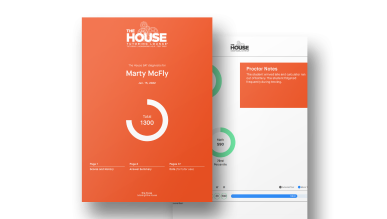The New Digital ACT Exam
Summary of Changes
The ACT test is undergoing significant changes to provide students with more flexibility and to make the testing process more manageable. Here's a detailed overview of the changes based on recent announcements:
Major Changes on the Digital ACT Test:

Reduction in ACT Test Length and Number of Questions:
- The test duration is reduced from three hours to two hours.
- The number of questions has decreased from 215 to 171, allowing for a 22% increase in time per question.
- Shorter passages in the English and reading sections.
- Overall, 44 fewer questions will be asked in the new format.

Optional Science Section:
- The science section will become optional, similar to the existing optional writing section.
- Students can choose to take different combinations of the test: ACT, ACT plus science, ACT plus writing, or ACT plus science and writing.
.png?width=498&height=299&name=Rectangle%20492%20(1).png)
Maintaining Core Sections:
- English, reading, and math will remain the core sections of the new Digital ACT Test.
- The composite score will still be the average of these three sections and will be reported on the same 1-36 scale.

FREE ACT or SAT Exam Diagnostic Testing & Evaluation
Preparing for your Summer ACT or SAT Exam starts now!

Implementation Timeline for the New Digital ACT Test:
National Testing:
- The changes will take effect for national online testing starting in spring 2025.
School-Day Testing:
- For school-day testing, the changes will be implemented in spring 2026.

Background and Motivation for changing the ACT Test
Digital Version and Superscoring:
- ACT.org began offering a digital version of the test in February 2023, which is not adaptive and mirrors the paper test.
- Superscore reporting started in April 2021.
Student and Expert Reactions:
- Students have generally supported the changes, appreciating the increased flexibility and reduced stress.
- Experts have mixed opinions. Some believe the initial tests after the changes might provide opportunities for higher scores due to additional time per question, while others caution about potential risks based on the initial digital SAT experience where questions were perceived as harder.
Addressing College Readiness:
- The changes come after ACT test scores hit a 30-year low, with significant declines in college readiness benchmarks, especially in math.
- ACT.org CEO Janet Godwin emphasized the need for these changes to ensure graduates are better prepared for postsecondary success.

Goals and Vision of the New Digital ACT Test:
Focus on Innovation and Accessibility:
- These changes reflect ACT's commitment to evolving to meet the needs of students and educators.
- The aim is to make the test more manageable and less fatiguing, enabling students to perform at their best.
- ACT continues to focus on providing accessible, reliable, and forward-thinking readiness solutions, ensuring every learner has the opportunity to succeed.
The ACT Test modifications are designed to improve the overall testing experience, making it more flexible and accommodating for students' diverse needs.

FREE ACT or SAT Exam Diagnostic Testing & Evaluation
Preparing for your Summer ACT or SAT Exam starts now!
Frequently Asked Questions about the New Digital ACT
The reduction in the number of questions and overall test length means that your child will need to adjust their preparation strategy to focus on quality over quantity. With fewer questions on the ACT Test, each one carries more weight, so it’s crucial to ensure a deep understanding of each topic. Time management strategies will also change since they’ll have more time per question. Encourage your child to practice with new test formats, emphasizing accuracy and comprehension. Using official practice tests and timing each section can help them get accustomed to the new pacing and format.
The key difference is that the digital ACT test is not adaptive and mirrors the paper test in format and difficulty. Choosing between digital and paper versions depends on your child’s comfort level with technology and their test-taking environment preferences. If your child is more comfortable reading on screens and typing, the digital version might be better. Conversely, if they prefer the traditional method of writing and flipping through pages, the paper version could be advantageous. Consider having your child practice with both formats to determine which they find more comfortable and effective.
Advantages: Taking the optional science section can demonstrate your child’s proficiency in scientific reasoning and data analysis, which might be beneficial for STEM-focused college programs. It provides an opportunity to showcase a broader range of skills.
Disadvantages: It adds to the overall test length and might increase stress and fatigue. If your child struggles with science or feels unprepared, it might be wiser to focus on maximizing their scores in the mandatory sections. Carefully evaluate your child’s strengths and college requirements to make an informed decision.
Many colleges consider scores from all ACT Test sections, including optional ones, for admissions and scholarship decisions. If your child is applying to STEM programs, a strong science score could be advantageous. Similarly, a high writing score might benefit those applying to humanities programs. However, not all colleges require these sections, so it’s important to research the specific requirements of the colleges your child is interested in. Taking these sections can show a well-rounded skill set, but ensure your child is prepared to avoid negatively impacting their overall score.
The English and reading sections now feature shorter passages and fewer questions. This change allows more time per question, enabling students to focus more on comprehension and analysis. Your child should adjust their study plan to include practice with shorter passages, emphasizing understanding main ideas, details, and inferences quickly. Using practice tests that reflect the new ACT Test format will help them adapt to the pacing. Encourage active reading strategies and practice summarizing passages concisely to improve efficiency and accuracy.
The increased time per question should reduce the pressure to rush through the ACT Test, allowing your child to answer each question more thoughtfully. This means they can spend more time analyzing each question and double-checking their answers. Teach your child to allocate their time wisely, ensuring they don’t spend too much time on any one question. Practice pacing with the new digital ACT Test format to build a rhythm that balances speed and accuracy. Encourage regular timed practice to build confidence and familiarity with the new timing.
ACT.org provides official practice tests and resources that reflect the new format. Encourage your child to use these resources to get comprehensive practice. Joining study groups or hiring a tutor can also provide targeted help and keep them accountable. Additionally, our test prep services offer free diagnostics and consultations with our test prep director to tailor a personalized study plan for your child.
The new Digital ACT Test, like the Digital SAT Test, is shorter and offers more time per question, but the ACT test retains an optional science section and does not feature an adaptive digital format. The SAT Test is now fully digital and adaptive, meaning question difficulty adjusts based on previous answers. Your child should consider their strengths and preferences. If they prefer a more straightforward test with consistent question difficulty, the ACT Test might be better. Conversely, if they are comfortable with an adaptive test and want a completely digital experience, the SAT Test could be a better fit. Trying practice tests for both can help in making an informed decision.
Educators and test prep experts generally view the changes positively, noting that more time per question can reduce student stress and potentially lead to higher scores. However, there is caution about the initial transition period, where students might need time to adapt to the new format. Experts recommend thorough preparation using the new practice materials and adjusting test-taking strategies to maximize the benefits of the increased time per question. Staying updated with expert analysis and tips can provide valuable insights into effective preparation techniques.
The changes, particularly the increased time per question and reduced number of questions, can help your child achieve a higher composite score by allowing them to focus more on accuracy and thoughtful responses. The flexibility to skip the science section if it’s a weaker area can also help concentrate efforts on their strengths. However, thorough preparation is crucial to adapt to the new format and pacing. Utilizing updated practice tests and focusing on weak areas will be essential in maximizing their potential for a higher score. Regular practice and familiarization with the new format will likely yield positive results.
Get in Touch with an
ACT Test Expert Today
Our devoted staff of educators and the most impressive and diverse tutors in Chicago (grades K - college) provide the very best in customized educational support in ALL academic subjects. We pride ourselves on providing a personalized experience for each of our students. We get to know what they are working on, but also what they’re passionate about. We create a safe and inspiring space for not only improving academic performance, but also their quality of life. Contact us today for a customized plan designed to support your student.
